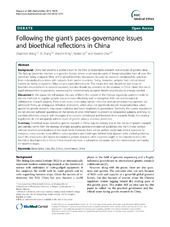| dc.description.abstract | Background: China has become a global player in the field of biosamples research and analysis of genetic data. The Beijing Genomics Institute is a genetics factory where enormous amounts of biosamples/data from all over the world are being analyzed. Most of the global bioethics discussions focused on research conducted by scientists from industrialized countries with subjects from poorer countries. Today, however, samples from industrialized nations are being analyzed in China on an unprecedented scale. This means that one should not just focus on bioethics developments in western countries, but also should pay attention to the situation in China. Under this era of rapid advancement in genomics, reassessing the conventionally accepted bioethical principles is strongly needed. Discussion: In this paper, we will analyze the case of BGI in the context of the Chinese regulatory system in order to identify methods to regulate genetic research more effectively and to strengthen BGI’s role in international collaborative research projects. Three main issues concerning sample collection and samples/data management are addressed. Firstly, an ambiguous definition of research, which does not specifically include biosamples/data, when applied to genetic research, may cause confusion and leave loopholes in governance. Secondly, the current regulations do not provide sufficient guidelines on the details of what information to present to prospective subjects, and how to combine informed consent with strategies of re-consent, withdrawal and feedback from research. Finally, the existing regulations do not adequately address issues of genetic privacy and data protection. Summary: Bioethical issues related to genetic research in China may be partially due to the nature of genetic research and partially stems from the strategy of simply adopting general international guidelines into the Chinese context without detailed considerations of the local needs. However, there are no perfect readymade ethical solutions for everyone; every country faces different open questions and challenges behind what appears to be unified guidelines. Given the importance of China in international genetic research, other countries ought to be concerned about the bioethical developments in China. China should also have a substantive discussion with the international community on bioethics issues. | en_US |

